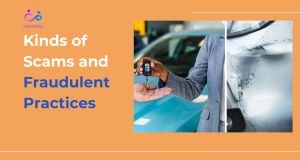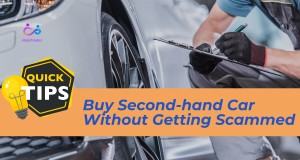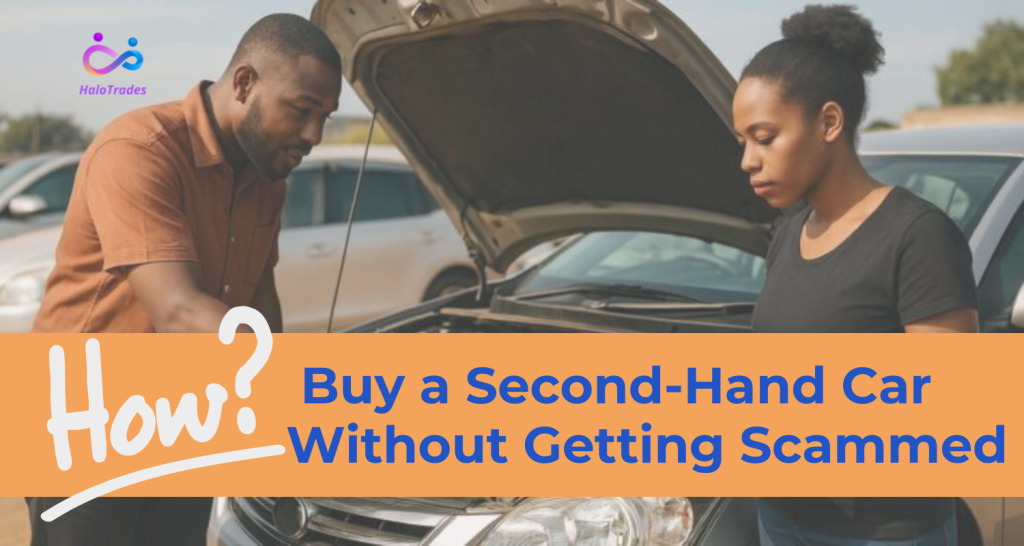Purchasing a used car has certain difficulties and can take time. Often a difficult chore involving a lot of research, discussions, and test drives, finding a decent second-hand car that meets your needs and budget takes effort. Still, there are other difficulties you can face when looking for a used car. Aimed at extracting more value from a car than it is truly worth, there are several scams in the used car industry seeking to fool consumers into purchasing a not-so-wonderful car at more expensive rates. If you want to buy second hand car, HaloTrades is the best platform for it. You can get a wide range of options and verified sellers. Grab the best deal with HaloTrades and save yourself from the frauds.
In this blog we share some kinds of scams and how you can save yourself from these frauds.

Kinds of Scams and Fraudulent Practices
The Old Bait-And-Switch
Listings help used car sellers present their inventory to possible consumers. These postings come across when looking for a decent car; customers then start asking questions regarding the car they have selected. The salesman tells them the automobile has already been sold when they show up at the dealership to look at it, though. To create a sale of more value, the dealer then tries to present different models or better trims instead of the automobile the buyer decided upon.
Flood-Damaged or Accidentally Damaged Cars
Major crash cars or those buried in water lose a lot of their value since they are judged dangerous and unreliable. But scammers routinely fix these vehicles such that they are functioning enough to sell them, then turn them over to new purchasers. Though they have been fixed, these cars are unreliable.
An accidental car that is fixed has already lost its structural integrity; hence, in case of another collision, the occupants can suffer terrible consequences. Likewise, cars damaged by floods or water tend to gather a lot of rust and corrosion. Rusty parts of a car have also lost their structural integrity and dependability.
Odometer Roll-Back
Odometer modification is among the most well-known frauds in the used car market. To get a better price for the car, dealers or sellers in this fraud cut the mileage a car has logged over its lifetime. This is a typical fraud in the used car market since used cars that have traveled fewer miles usually sell more. With older cars with mechanical odometers, these frauds were simple to execute; with the modern digital meters, they were supposed to be rather tough. But new techniques have emerged wherein fraudsters may readily change odometer readings even in contemporary vehicles.
Original Parts Counterfeits
Another well-known fraud is substituting inferior counterfeit OEM parts. Since OEM components usually cost more than their low-quality counterfeit counterparts, this method helps dishonest dealers profit on the selling of outdated parts. Moreover, con artists totally remove non-essential parts, therefore rendering some of the car useless.
False Inspection and History Notes
To convince consumers to purchase inferior cars at premium prices, used car dealers could create false histories. By means of emphasis on the fact that the vehicle has been extensively evaluated by an expert, these reports are supposed to inspire trust in the consumer. But the false reports are basically intended to cover car issues that might become expensive repairs for the future new owners.
Strategies of Vehicle Cloning
Vehicle cloning is another often utilized tactic among used automobile frauds. Cloning is replicating the identity of one car on another. Usually stolen, the vehicle that gets the new name can cause issues for the buyer since procurement of this vehicle might become difficult. Often searching internet markets for identical makes and models, fraudsters replicate their number plates onto the stolen vehicles they are selling.

Tips to Buy Second-hand Car Without Getting Scammed
Request the Car’s History
Ask the dealer or seller of a used car for its whole history if you are thinking about it. Records of former owners, accident history, service records, and if the car has ever been involved in any significant events, including floods or accidents, should be able to be given to you by a respectable dealer. Should the seller show little documentation or delay, it could be cause for concern.
Research Regarding Car
Spend some time researching the particular car model you want before you start shopping. Research reviews of other buyers to find out about the car’s performance, dependability, and usual issues. Look for any recalls connected to that model and verify the handling of the car you are considering. To find out how well the car has been maintained, ask the seller for maintenance and service documentation; this will help you in discussions by pointing out probable problems.
Verify the Seller
Crucially, you should know who you are buying from. Ask a private seller about their ownership record and the reasons they are selling the car. Search for red signals, such as evasive responses or unwillingness to offer supporting records. Research the reputation of dealers or online platforms by means of reviews and ratings if you are using one. Reliable sites sometimes run background checks on their vendors, therefore offering security and assurance.
Observe Mileage
Mileage can reveal details about the possible life and usage of the car. A car with abnormally low mileage for its age can cause questions since it could indicate that the automobile was not regularly driven, which would cause mechanical problems due to lack of use. Should the mileage seem too perfect to be accurate, it could suggest odometer manipulation. Always compare the mileage to the car’s service records and take the average mileage of similar cars into account.
Try Not to Rush
Purchasing a used car calls for careful thought. Step back and review if a bargain appears too good to be true or if you are under pressure to seal the sale fast. Usually dishonest sellers always try to manipulate your judgments and try to fix the deal in the very first meeting. They didn’t give space to think to buyers. So always try to be calm and don’t rush into making decisions.
Avoid Paying in Cash
Avoid paying for the car in cash or via untraceable payments to guard yourself against possible frauds. Rather, choose safe payment methods such as credit card, bank transfer, or a financing arrangement providing consumer protection. Always request a receipt or evidence of payment; make sure the transaction is recorded correctly to protect your interests. If you have to pursue a refund or legal action, this provides you another degree of protection.
A reliable platform makes all the difference in the buying process of second-hand cars. HaloTrades is the best platform for authentic dealing with verified sellers. You can get the direct deal with the owner of the car. A direct interaction can bring lots of difference in the buying process. No broker, minimal platform charges can reduce the chance of fraudulent practices. We verify the vehicle details shared by the seller on our platform and list only the authentic sellers.
Wrapping up
Buy your dream car under your budget by using the HaloTrades platform. Buy second hand car from verified sellers. Choose from a wide range of models listed on our platform. Save yourself from the above-mentioned scams by using the tips shared in this blog. We are always here to support you. To know more about our platform and listing your second-hand car or buying used cars contact us.


